Disclaimer: This post contains affiliate links to handpicked partners, including tours, gear and booking sites. If you click through or buy something via one of them, I may receive a small commission. This is at no extra cost to you and allows this site to keep running.
The controversial topic about riding elephants in Thailand reflects the ongoing plight of the Asian elephant as it continues to be affected by this abusive tourism practice. Together, by raising awareness of why riding an elephant is wrong, we can help to end this form of entertainment.
There are many reasons why you shouldn’t be riding elephants in Thailand, and visiting the Elephant Nature Park in Chiang Mai enlightens you as to why. It remains one of my most significant and most valuable lessons in travel about wildlife tourism in South East Asia.
You will never RIDE an elephant, anywhere, EVER again.
I’m a responsible traveller and do my best to adhere to best practices and highlight topical issues regarding community and conservation in tourism. I aim to practice what I preach; dedicate time to long-term volunteering and projects close to my heart; support local people and community enterprises, and be aware of how and where I spend my money.
But I’m also guilty. While I never visit poorly run zoos, join baited cage dives with animals or give money for a picture with a dancing monkey, I have engaged in harmful tourism practice when it comes to the treatment of elephants in Thailand and Asia generally.
In India, I was used to elephants wandering the streets as if they had as much right to roam like a local, a goat, or a cow – almost majestic in their presence. In 2009 on my first trip to Thailand, a country symbolic of everything elephant-related, my curiosity got the better of me. I rode an elephant through a small area of the jungle outside of Chiang Mai that was, back then, promoted as a conservation park.
Then in 2012, in Chitwan National Park in Nepal, I embarked on an ‘elephant safari’ following a rhino through the dense jungle while four of us sat in a large square wooden hold strapped to the elephant’s back. The next day I sat on an elephant as it bathed, and almost instantly, it tried to throw me off.
Only then did the sheer unhappiness of these creatures strike me. The realisation that while we humans pale compared to the size of an elephant, this kind of contact violates their freedom and makes them unhappy. I vowed never to engage in such practices ever again.
As a firm believer in karma, I’ve always felt guilty about my actions. I tell people not to ride elephants or bathe with them to counteract my actions.
I want to educate people about why you shouldn’t ride elephants in Thailand or anywhere else.
I listen to people respond that they will do it anyway because it’s the only means of interaction they have found available. But if you take away these cliché tourist experiences, it doesn’t mean you CAN’T have contact with these magnificent creatures.
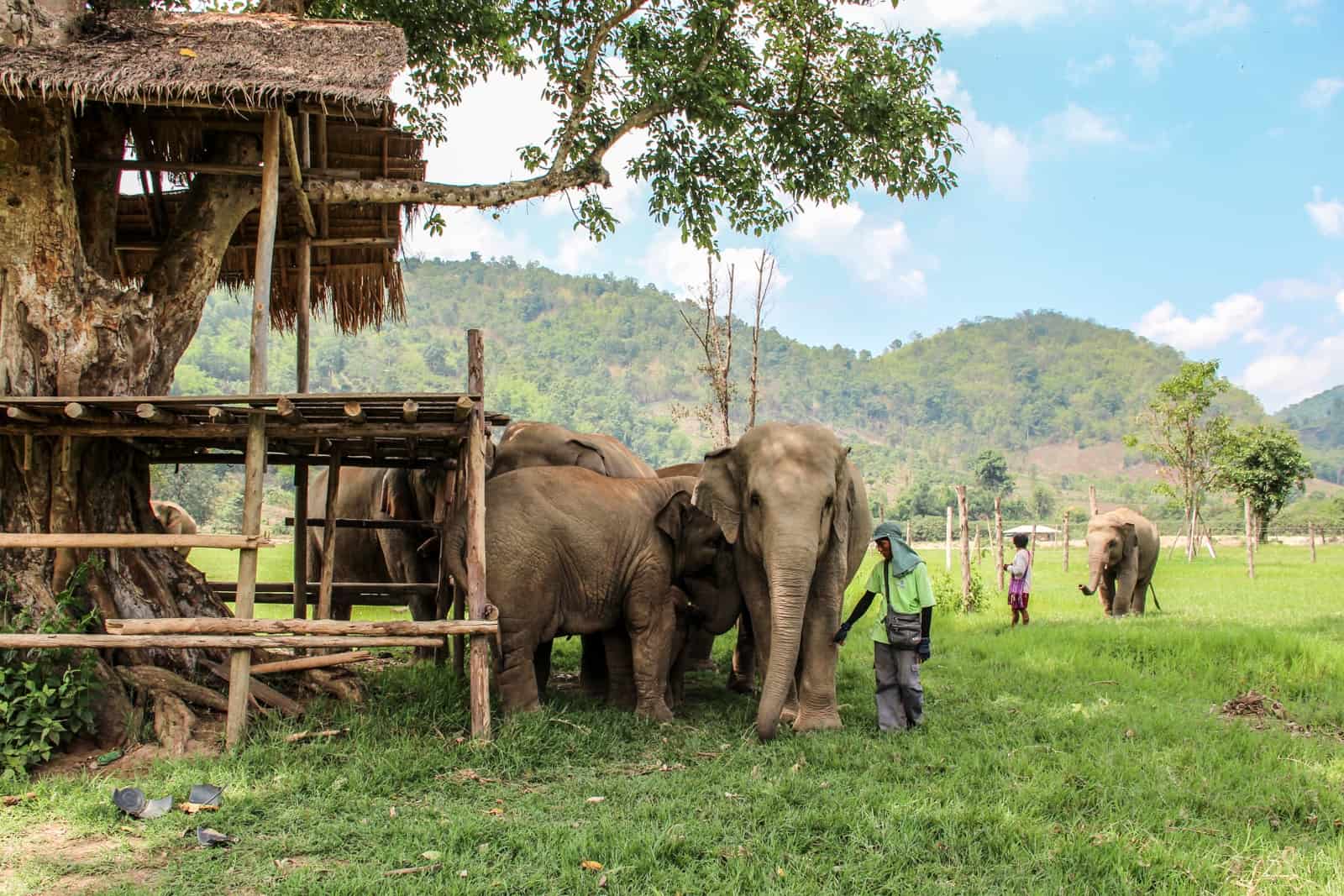
We need to save the endangered Asian Elephant, not be responsible for their demise.
Contents
- The Truth About Riding Elephants in Thailand
- Chose an Ethical Elephant Sanctuary in Thailand
- Responsible Interaction with Elephants in Thailand
- Feeding Elephants Responsibly
- Bathing Elephants Responsibly
- Why You Shouldn’t Ride Elephants in Thailand
- Further Information
- Help End Elephant Rides in Thailand – Pin It!
The Truth About Riding Elephants in Thailand
Elephant tourism in Thailand exists because there is still a high demand for travellers looking for places to ride and bathe with elephants for entertainment. This exploitation of elephants began following the changes in Thailand’s logging industry, where elephants were the primary source of labour.
In 1989 logging was banned in Thailand, putting working elephants out of a job. Thailand sold many elephants to neighbouring countries such as Burma, and those elephants left were seen as pests. The population of elephants in Thailand quickly declined, but those that remained were left with one legal option – working in tourism. Many elephants were (and still are) abandoned or left to die without it.
Except to work in tourism, elephants get subjected to a horrifying and abusive ‘training’ process called “the crush”. Living in cruel living conditions, shackled and beaten, the elephants suffer extreme psychological and psychical abuse as part of a method to get them to submit to humans and basic commands.
While tourism has given elephants a new lifeline, there are no strict penalties for abuse and no extensive measures to avoid mistreatment.
Only half of the Thai elephant population is considered endangered – and that’s the wild ones. The rest, per Thai traditions, are seen as livestock or ‘domesticated’ and are therefore not protected.
Elephants are highly intelligent and social animals, and this means of taming them produces nothing more than one of the cruellest shows on earth where you become more than just a spectator, but a participant.
Chose an Ethical Elephant Sanctuary in Thailand
In Chiang Mai, I researched, collected promotional leaflets and looked at treks, tours and day trips from local providers. All offered itineraries that included riding elephants – precisely the kind of ill practice I was trying to avoid.
Except at Elephant Nature Park. This sanctuary is a home for the elephants, not where the animals are forced to work. Established by award-winning conservationist, Sangduen “Lek” Chailert over 16 years ago, it’s a project that rescues injured and mistreated elephants and educates tourists about responsible practice.
Even a neighbouring elephant camp has decided to try out the Elephant Nature Park’s concept of care and retire their female elephants from tourism treks.
The Elephant Nature Park in Chiang Mai
You can visit Elephant Nature Park for one day (2,500 ฿), as I did, or do an overnight stay (5,800 ฿), multi-night and volunteer weeks (12,000 ฿).
All visits include transport to the project site from the ENP city office, bus station or the hotel where you are staying.
You can find an overview of the visit and volunteering packages here and book a full day trip, including hotel pick-up and drop-off.
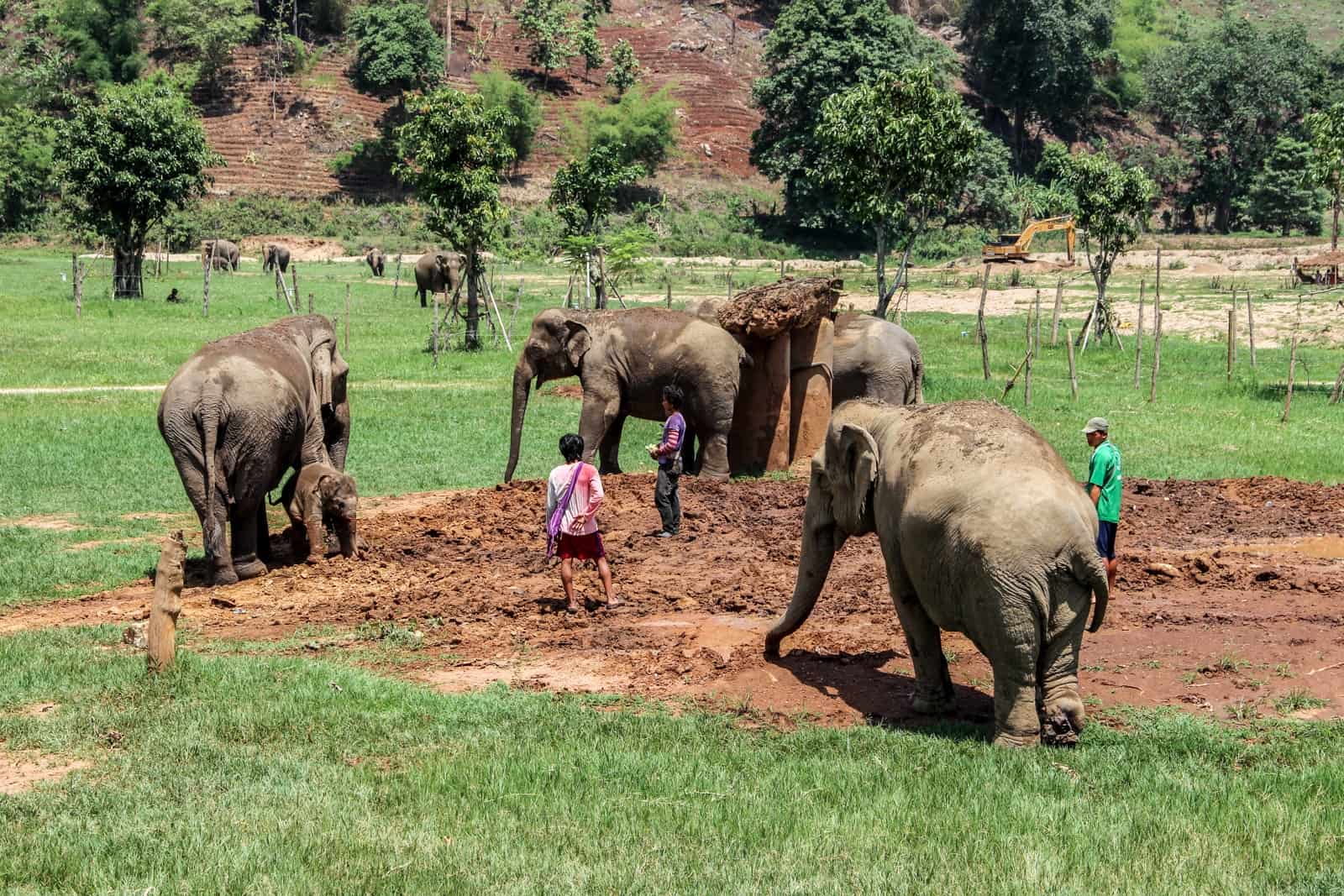
You shouldn’t be riding elephants, only observing them in the wild.
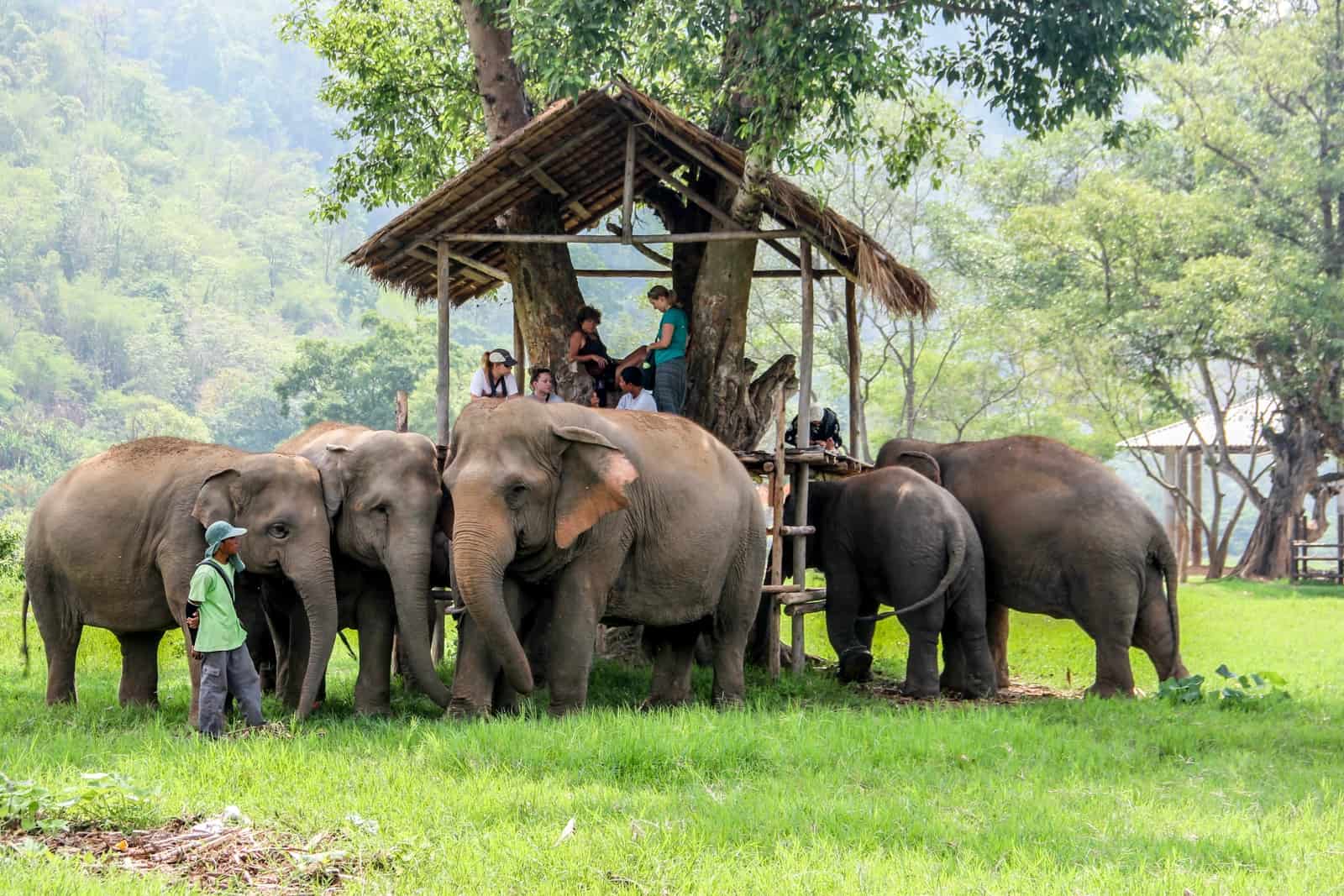
Choose an ethical elephant sanctuary like Elephant Nature Park, with responsible ways to view and interact with the animals.
The elephants at Elephant Nature Park come mostly from abusive pasts, including being overworked in trekking camps, forced breeding and street begging. It leaves them with permanent injuries from the horrific torture they endure at the hands of their owners, who use a practice known as ‘phajaan’ or the ‘crush’.
The elephants are tied up in a small cell-like structure for three days and nights, beaten and subjected to sleep deprivation and hunger to break their spirit and conform to demands. Except for the elephants born at the park, all bear the scars of this tragic past.
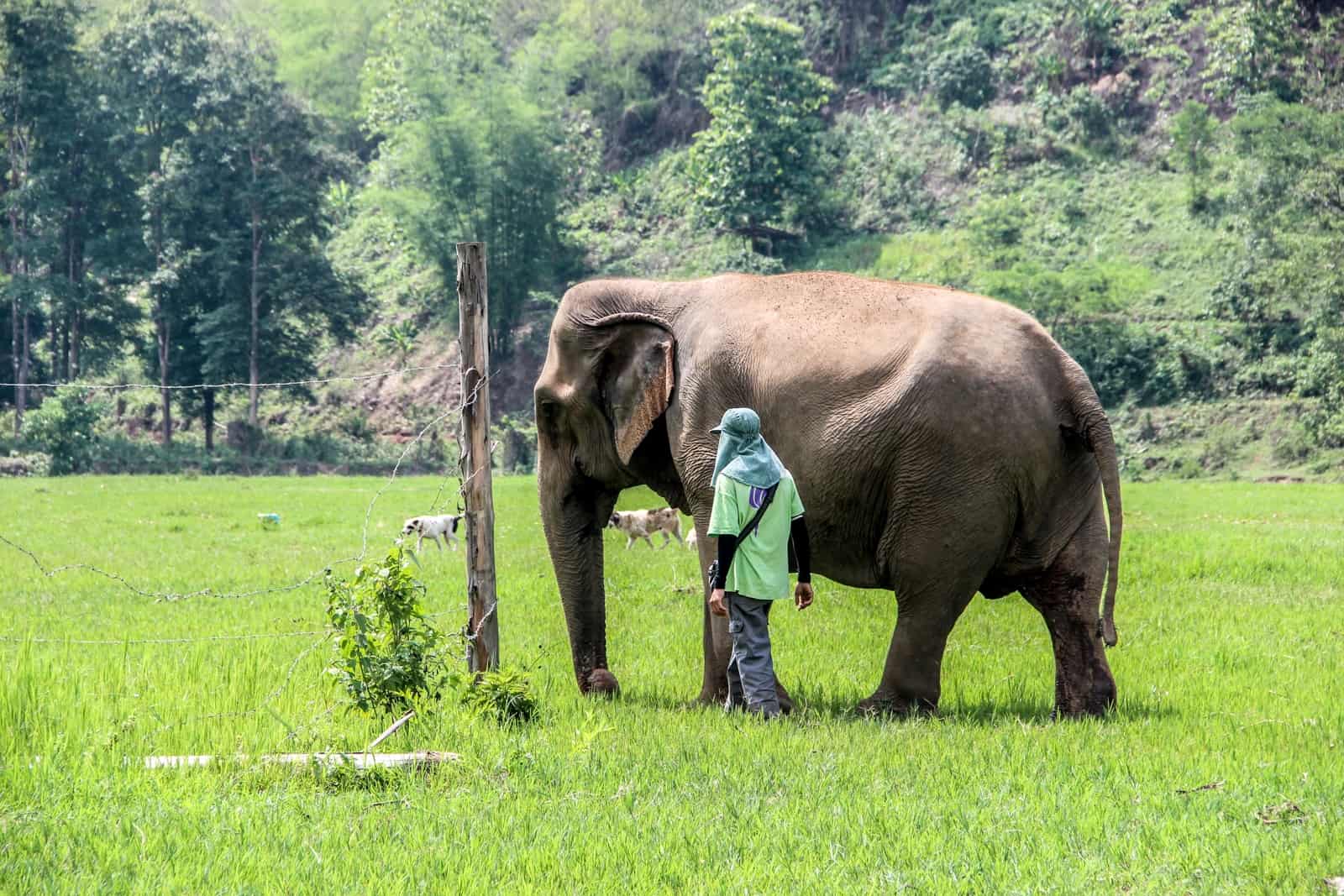
Responsible interaction with an elephant without riding one at an Elephant Sanctuary in Northern Thailand.
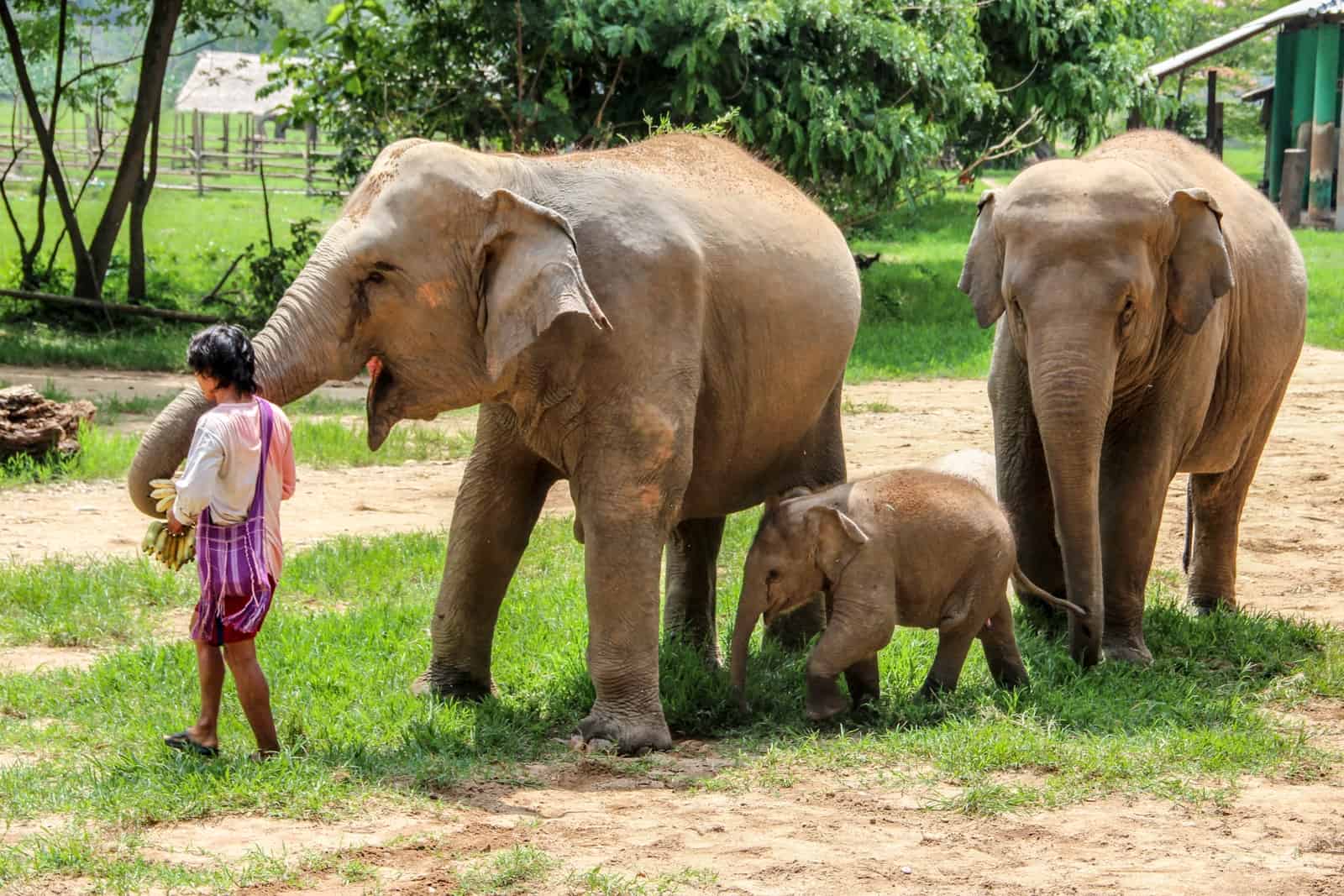
Elephants enjoy at the Elephant Nature Park after a life of abuse and mistreatment.
Responsible Interaction with Elephants in Thailand
At the park, you spend the entire day interacting, observing and assisting with the feeding of the animals. As soon as you arrive, you are given a quick orientation tour and are straight out in the vast green 250 acres of landscape these elephants get to call home.
With dense parkland, a river and a mud bath at hand, the elephants roam freely and do as they please.
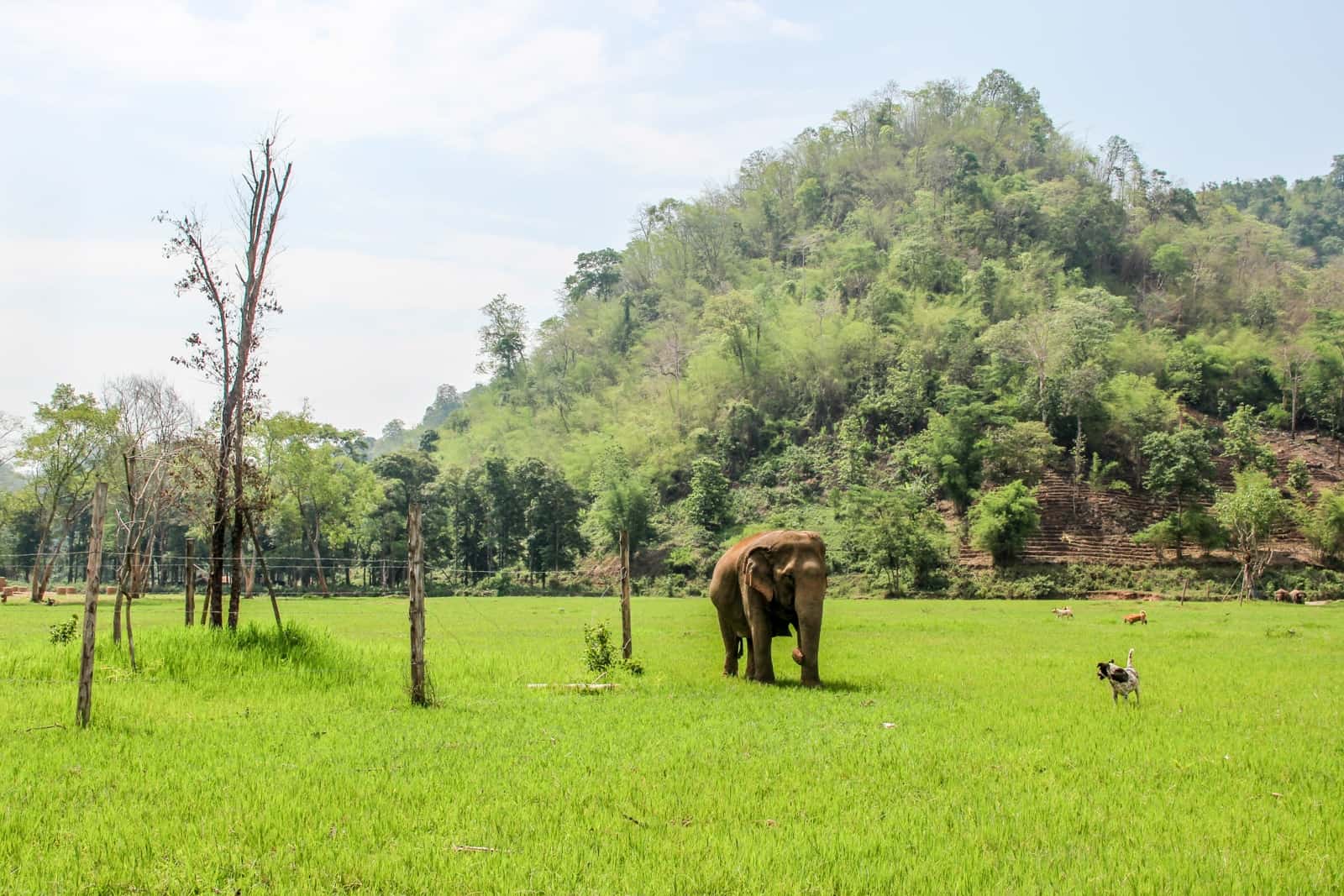
Freedom. Say no to elephant riding in Thailand.
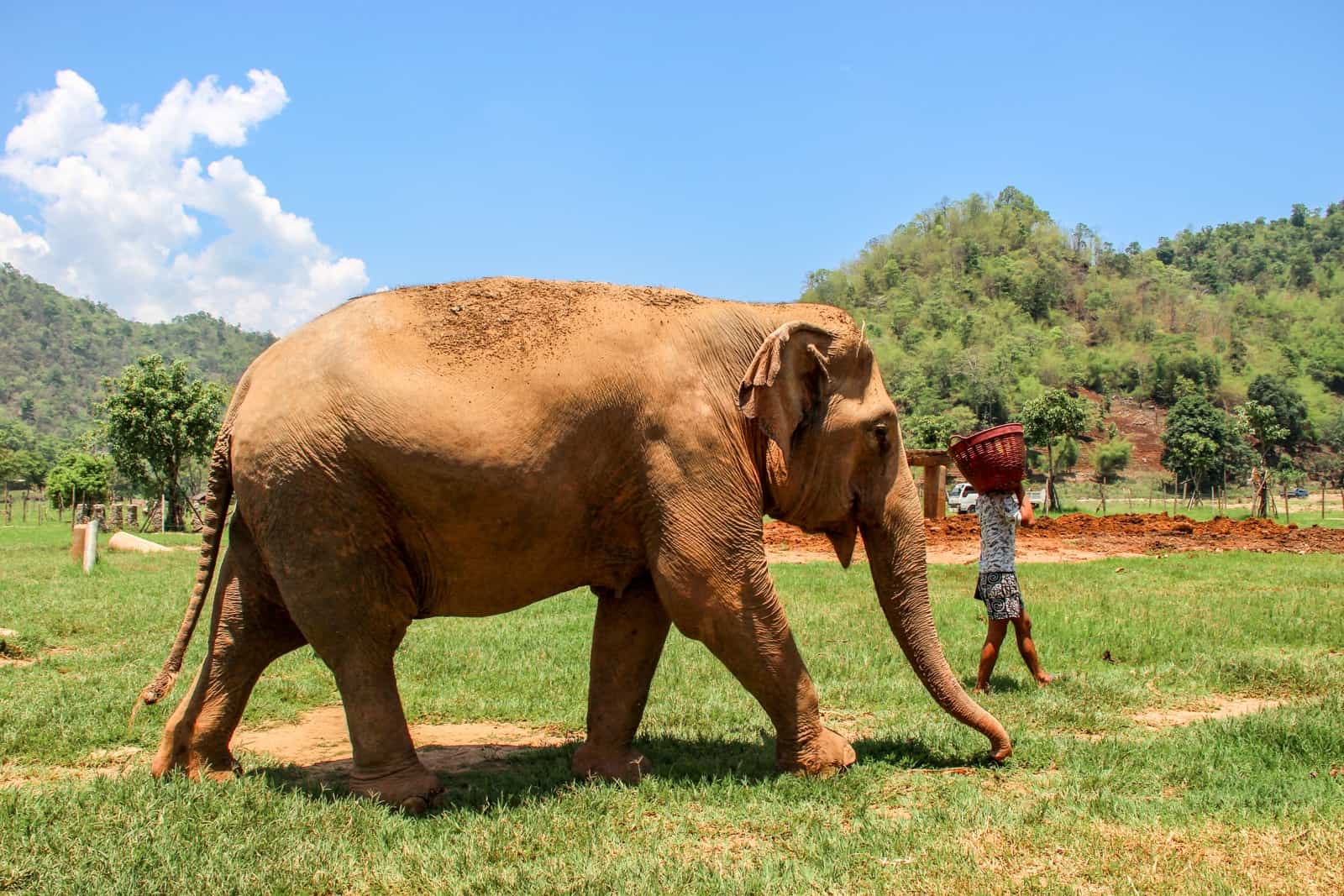
Life in 250 acres of landscape at Elephant Nature Park.
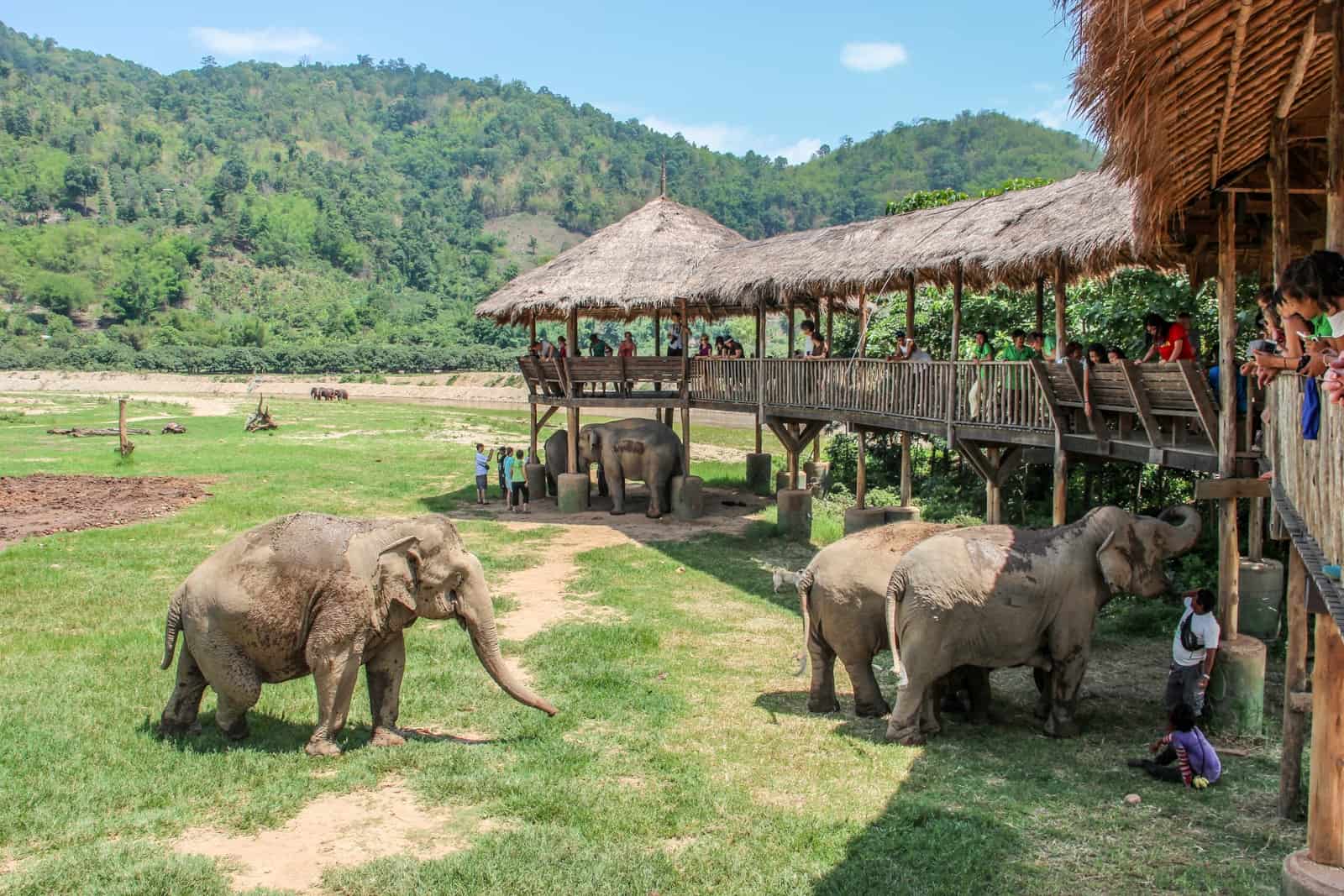
You can interact with elephants without riding them.
A guide is always with you, taking you to the best viewing spots via the walking platforms or out in the open, where you can interact with the elephants freely alongside each of their caretakers.
The elephants are cheeky, happy and eager to give hugs and sloppy, trunk-slurping kisses to their caretakers and visitors.
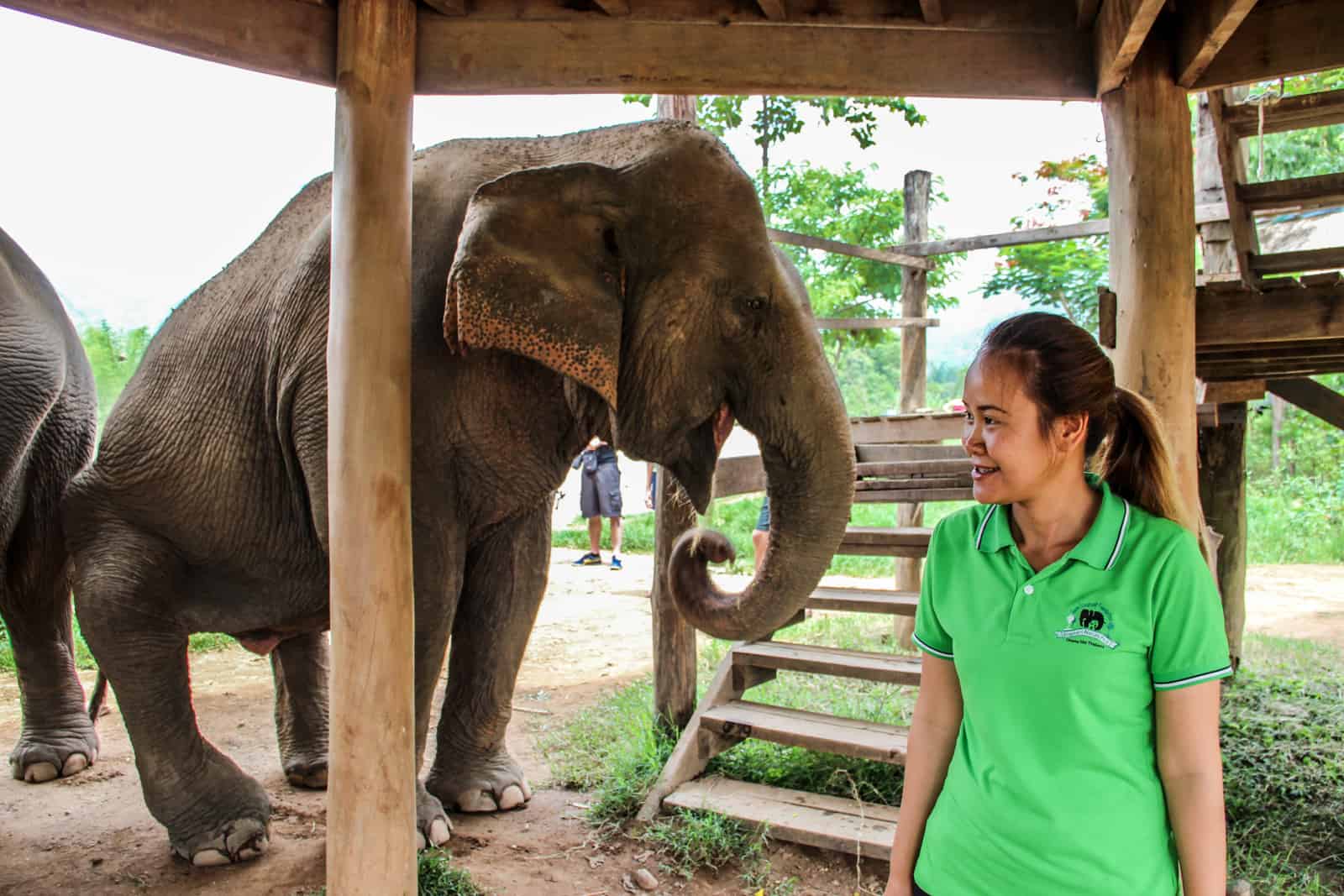
Guides are with you at all times during your interactions with the elephants.
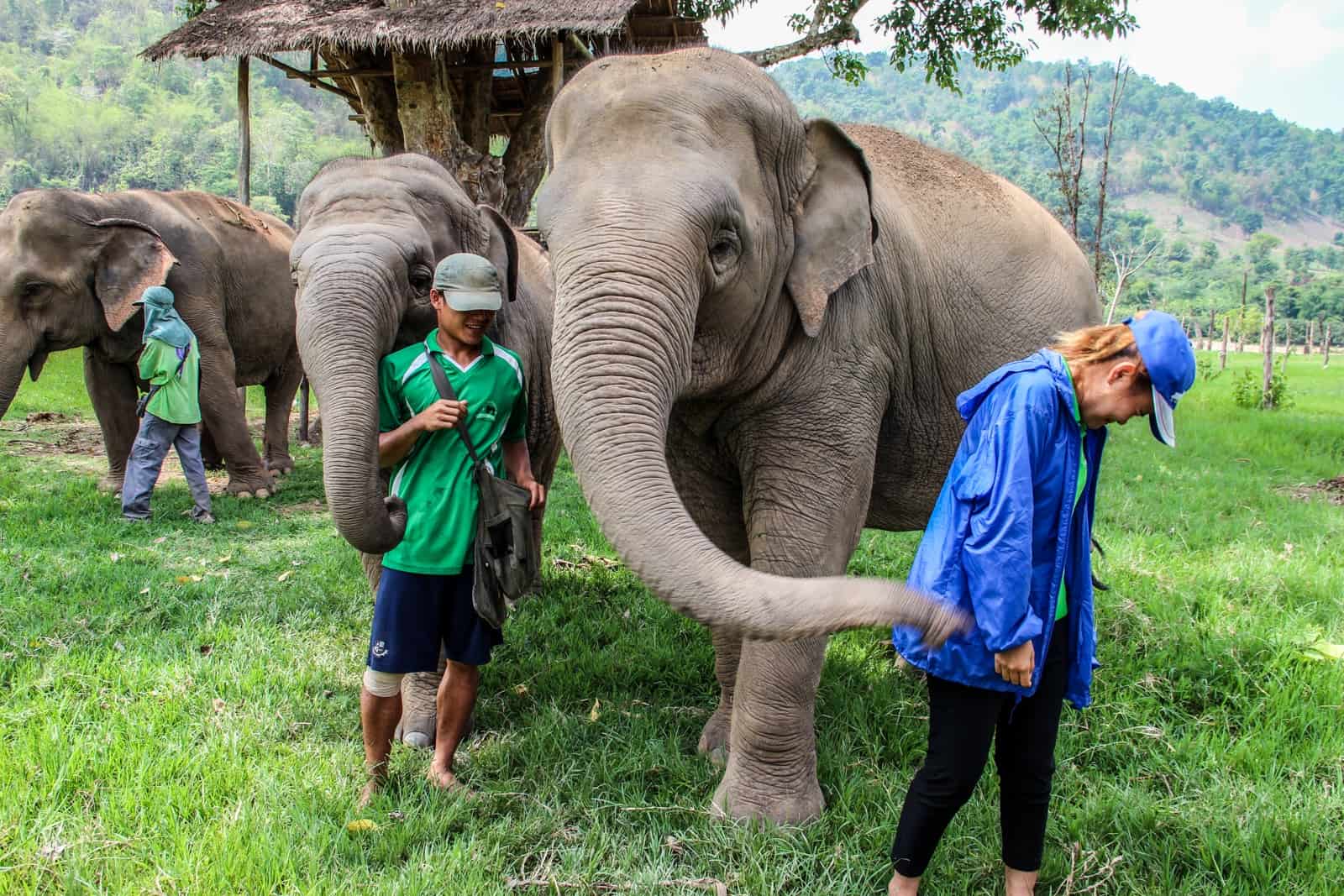
Playful elephants know the Nature Park guides and carers.
You immediately notice that there is no hitting, shouting, or the use of tools from which inflict pain to force action. The park does not have forced breeding or the use of chains (something I have seen all too often at other parks).
There are also no shows, no rides, and no gimmicks like elephant painting. Instead, all that radiates from the elephants and everyone that works here is love, trust and positive reinforcement.
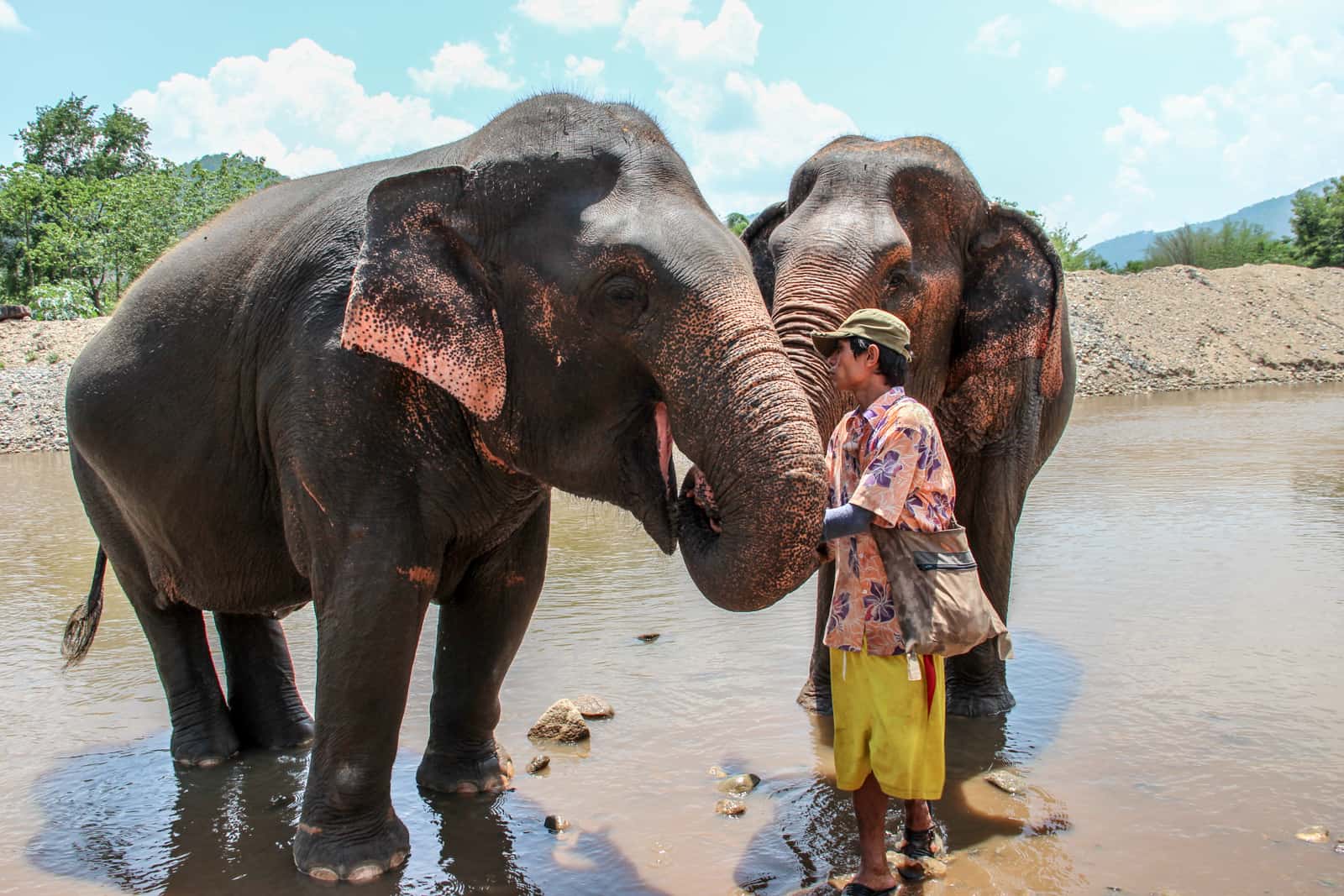
No shows, no rides, and no gimmicks. Just love.
Feeding Elephants Responsibly
Everyone is encouraged to get involved with feeding time. As the elephants arrive, you are overwhelmed by the crowd of trucks swooping up and sniffing all around for their eagerly awaited treats.
Placing a big chunk of fruit or a small bunch of bananas at the end of the elephant’s trunk, it’s in their mouth and swallowed quicker than you can reach into the basket for the next piece. The cheeky ones even find a way to outdo you, swooping their trucks into the empty food basket to hoover up every last bit.
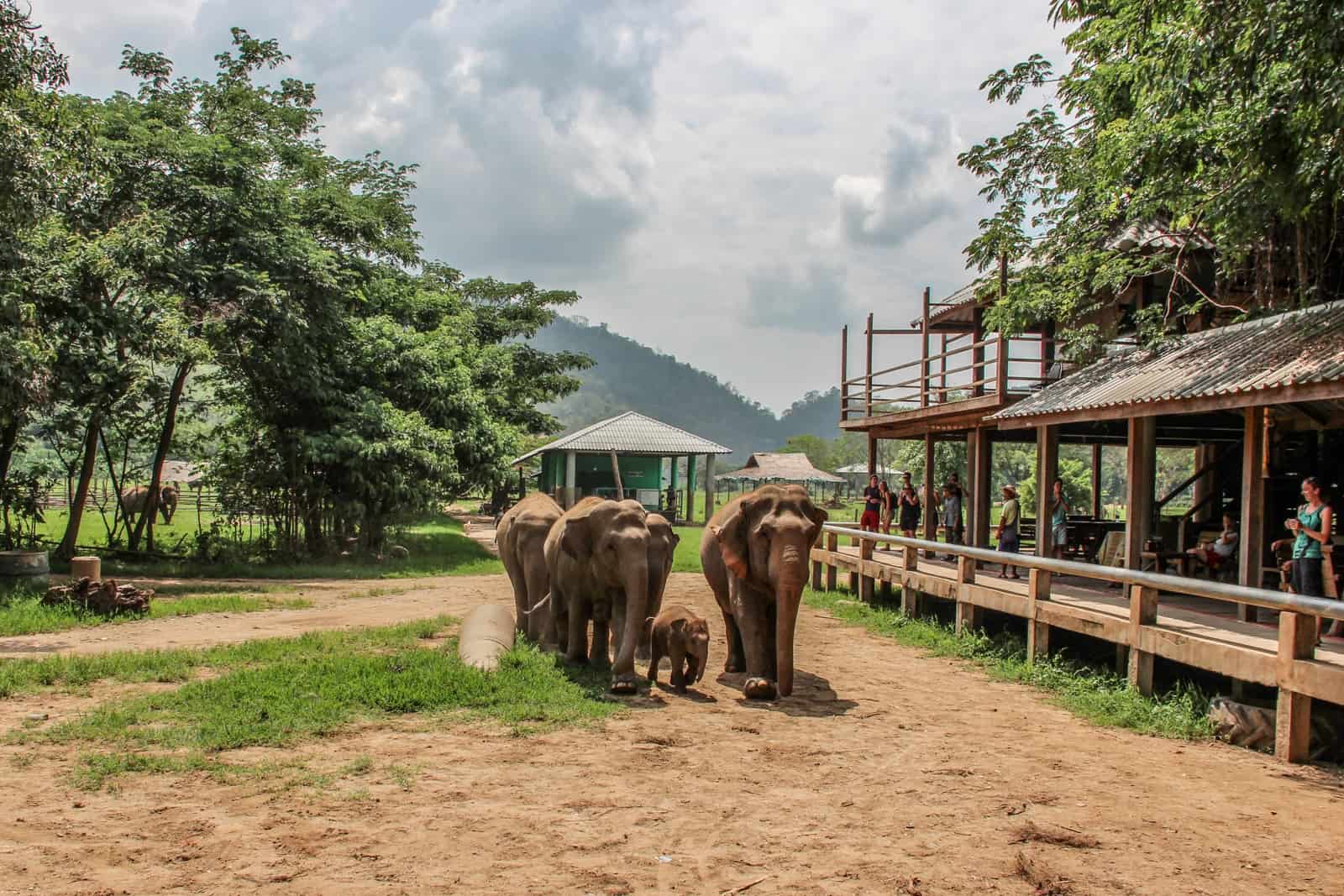
The elephants arrive at the feeding station.
Getting so close to the elephants takes a bit of getting used to, but once you get the hang of it, it’s an incredibly humbling experience to have such close interaction with them for such a long time.
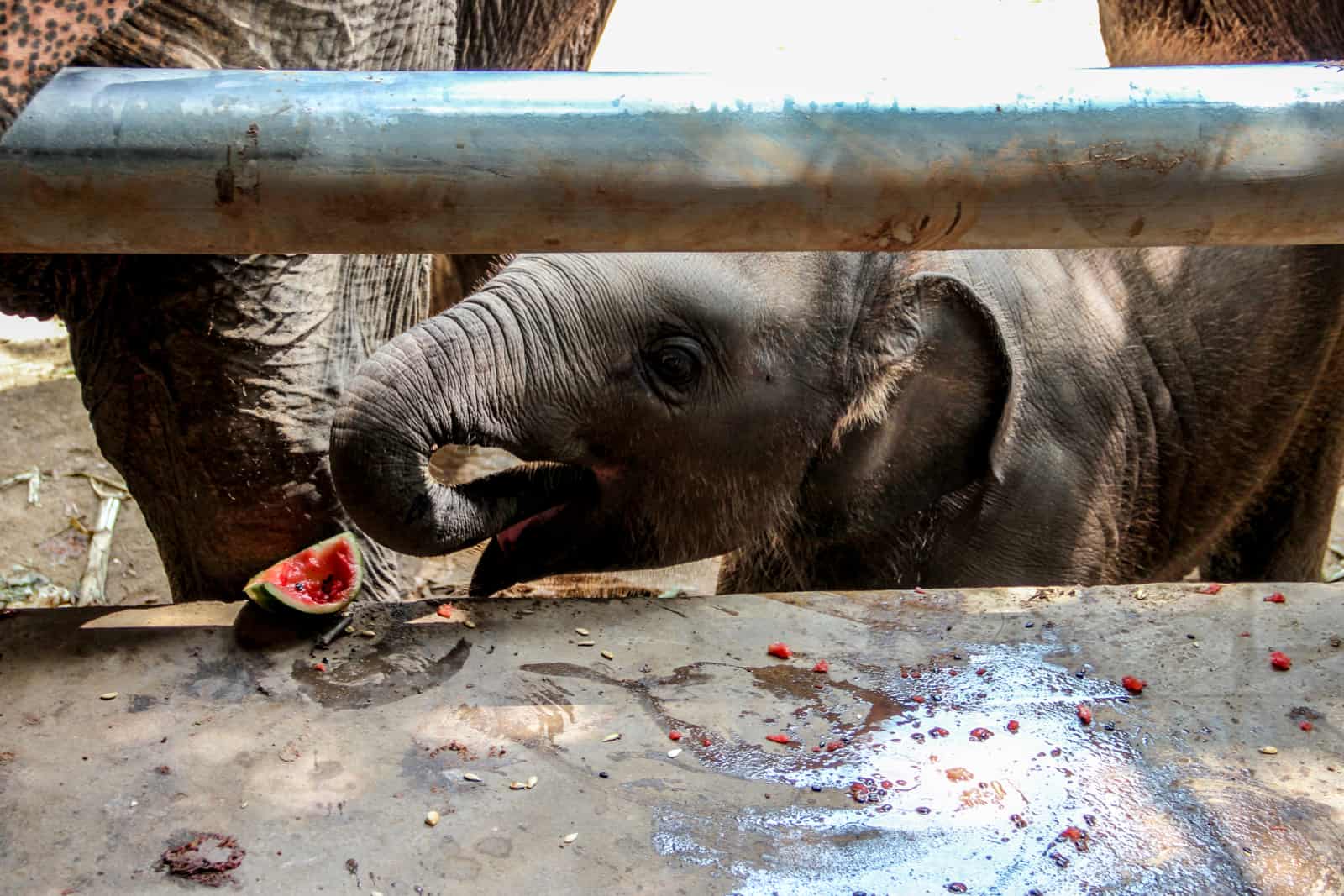
Hungry baby elephant at feeding time.
Bathing Elephants Responsibly
Do you think an elephant loves shooting water at you through its trunk while you jump around on its back while the mahout continues to hit it throughout the ‘performance’? Hell no! You won’t see that here – not even the caretakers climb on the animals!
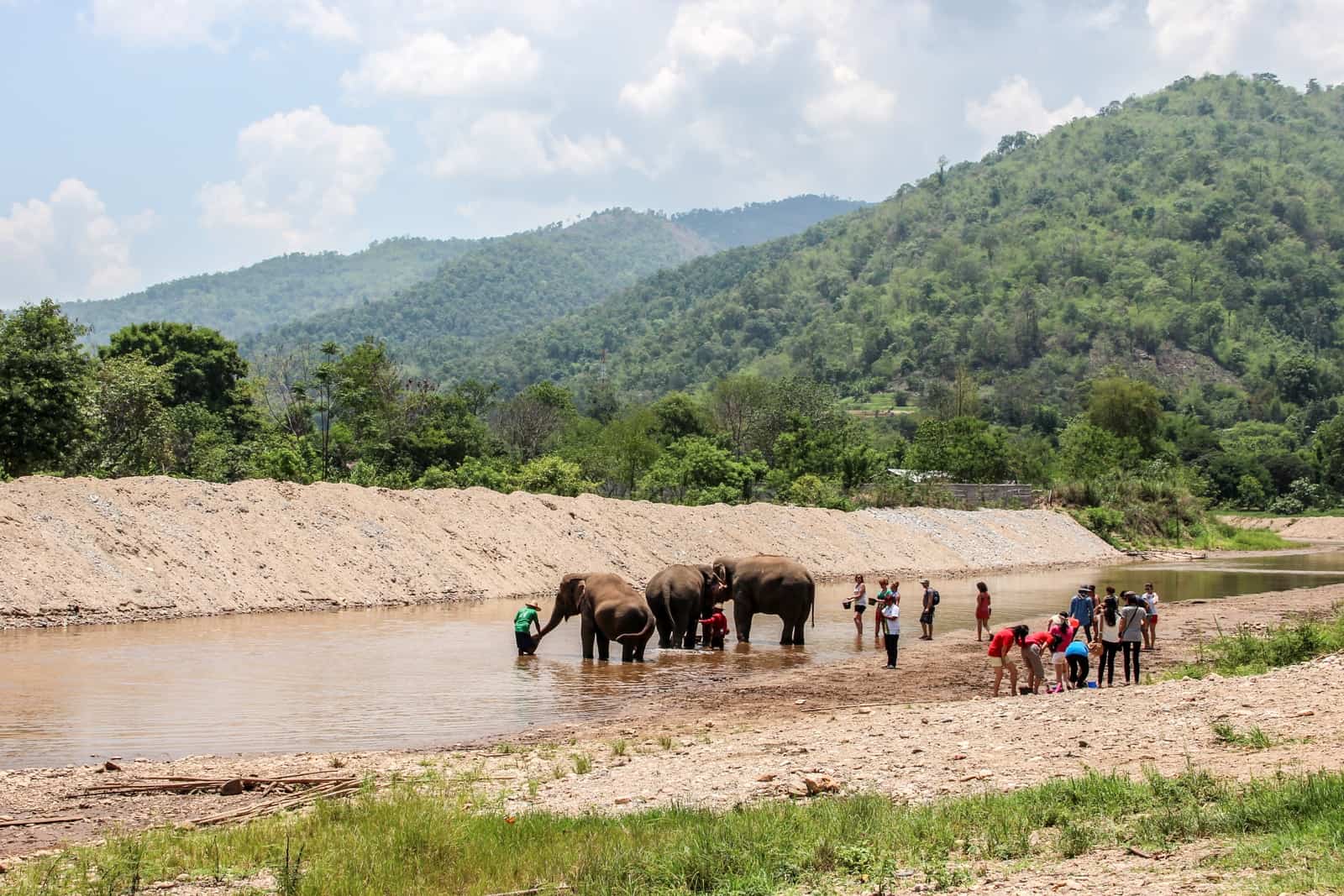
Elephant bathing without abusive practice.
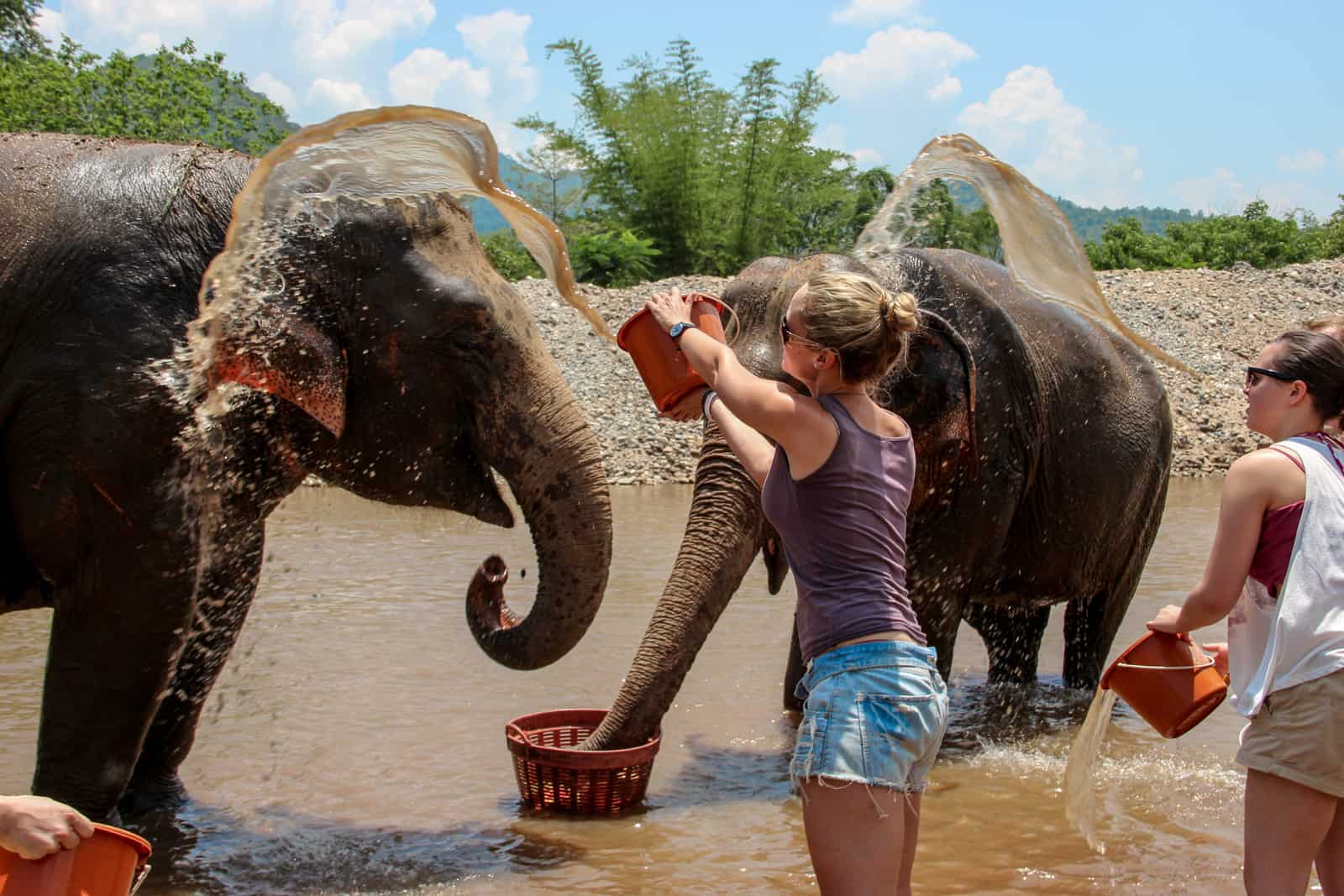
You don’t have to ride or sit on an elephant to help bathe it.
Walking down to the river, you get a plastic bucket for one of the most fun parts of the day – bath time! Everyone, including the caretaker, swoops bucket after bucket of water and throws it over the elephant as it leisurely enjoys being cooled down in the baking northern Thailand heat.
You know you’ve done an excellent job when the elephant trunk hugs its caretaker in delight.
Why You Shouldn’t Ride Elephants in Thailand
Elephant Nature Park promotes a core education and awareness programme that is helping to overcome a huge problem that exists with tourists riding elephants in Thailand.
After a hearty lunch and a slow wander around the site, you learn more about elephant conservation and the problems in Thailand and much of Asia. More heartbreakingly with a video of “the crush” process – it’s both graphic and heartbreaking.
The videos explain how the industry exists today following the time elephants were used for logging. You will never think to ride an elephant, bathe with an elephant, take an elephant safari ride, or support any project that sees elephants painting or performing anywhere in the world, ever again.
Lek hopes to change all that with her project, where tourism can move away from exploitation and bring elephants back to their natural environment through rehabilitation and education.
After all, what would Thailand be without its elephants?
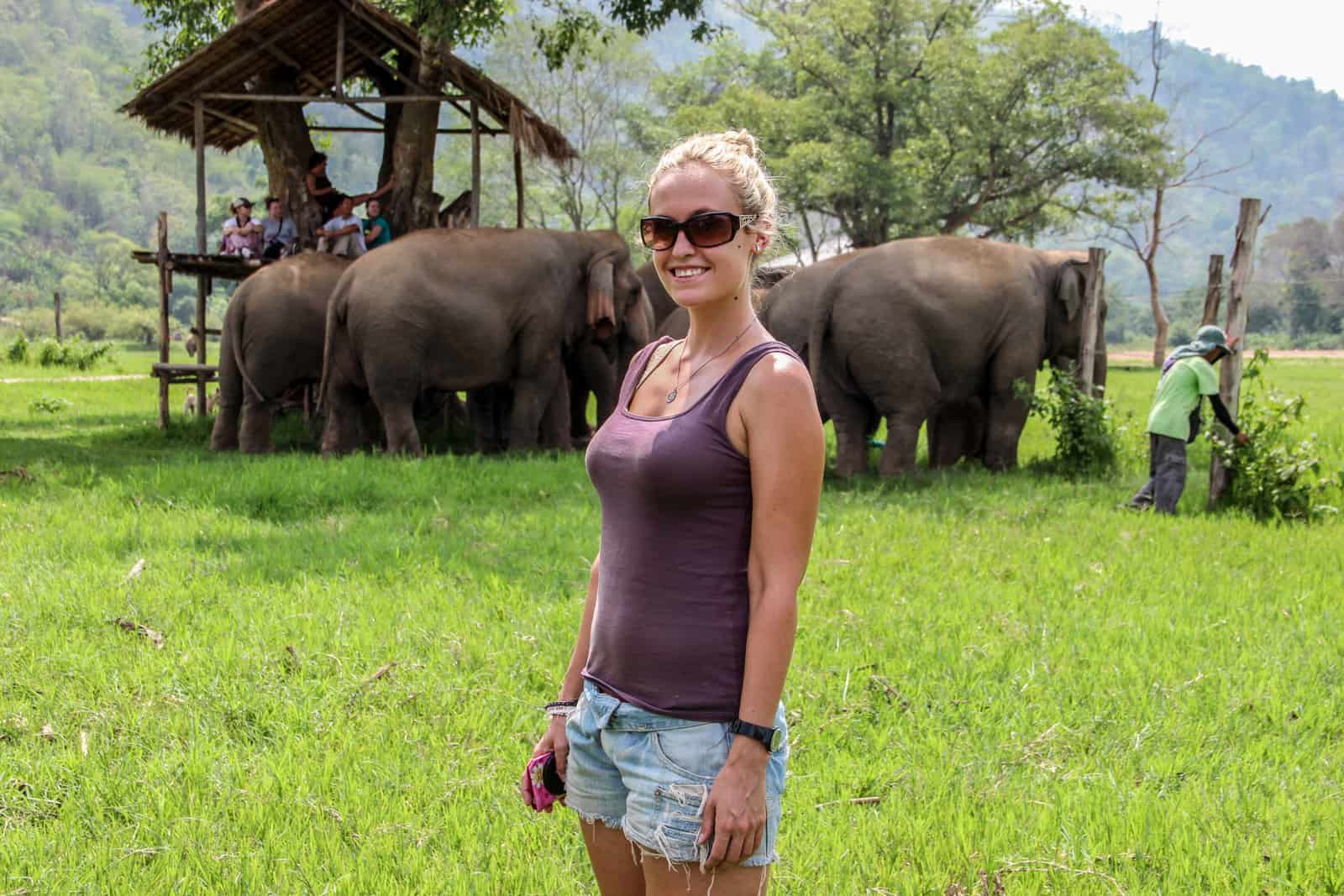
Education and awareness. The best kind of experience seeing elephants.
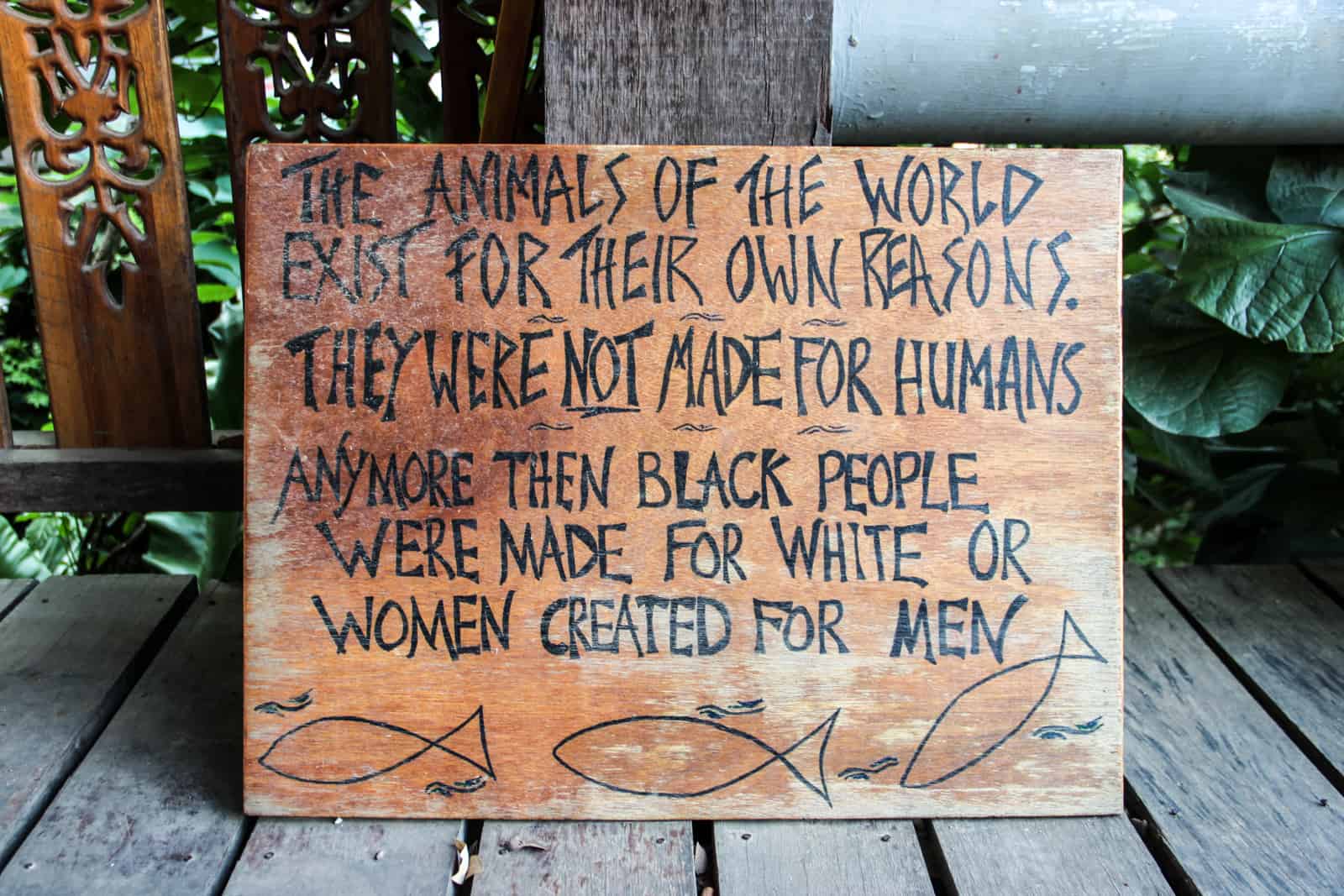
Elephants were not made for humans.
Further Information
Taking the overnight train from Bangkok is the best way to reach Chiang Mai – an arty, nature-encased city worth spending a few days in.
For more information about Elephant Nature Park, visit their official website.
For more Borders of Adventure articles on best animal practice and conservation, read:
- Taking a Chengdu Panda Tour: Conservation and Education at China’s Cutest Tourist Attraction
- Seeing Orangutans in Borneo Responsibly – Semenggoh Centre, Sarawak
Help End Elephant Rides in Thailand – Pin It!
Elephant Nature Park invited me on a one-day visit to experience the incredible work being done here and help raise awareness of the plight of the endangered Asian elephant. They did not ask me to write a favourable review and all opinions in this article remain my own based on what I saw, felt and learned.

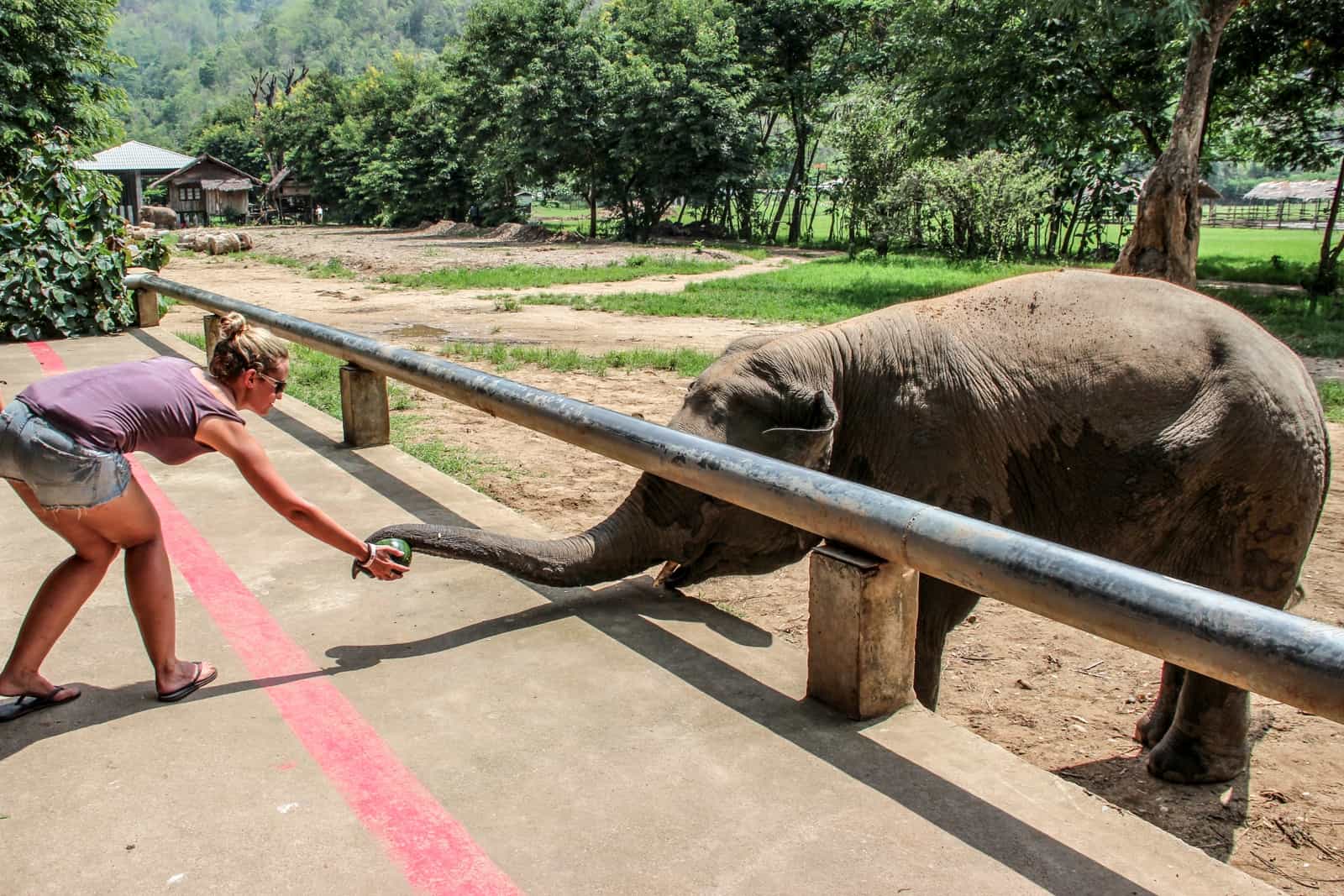
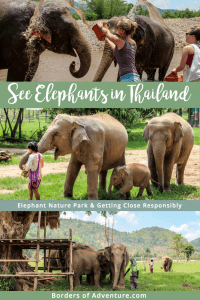

John Rodgers says
This post was very well presented. Animal abuse is right below child abuse. Thank you for your information.
Katie Diederichs says
I’m with you on this! We’ve traveled to Thailand a few times now and I strongly advocate choosing ethical elephant sanctuaries. I’m sharing this so everybody knows. Let’s make a difference!
Hilton says
Tourists should not ride elephants anymore. Good job highlighting this problem.
patrick says
You are right. Elephants are not to ride I think. But they look super cute!!!!!!
Veera says
Yay for finding your post about this <3 I'm going here tomorrow and am so excited I cannot even handle <3 <3
Becki says
You will NEVER forget it!
Rasna Bedi says
Hi Becki,
I loved reading your post, your guilt from your past wrong doings sounds exactly like mine. I was in India in September 2015 and rode an elephant. I came home and did some research and was saddened at what I had done. I also try and tell people to research before they go on such trips, and they always say the same thing, that they don’t care or want to do it anyways.
I loved your post and I love that you are trying to make a difference.
Barbara says
I am extremely excited about going to ENP and becoming part of a team of dedicated individuals who care for these magnificent majestic animals. I am drawn to this like no other humanitarian project I have participated in. I have a few questions however.
1. What time of year is best to go ?
2. I plan on a 6-7 day stay at ENP but would like to go to Thailand for 10-14 days. Do you have a suggestion on what else I can do or where I can go?
Becki says
Hi Barbara. It may well be worth contacting ENP and seeing if they need people at a specific time of the year, in comparison to others.
If you have up to two weeks in Thailand, it’s easy to travel to places between Chiang Mai and Bangkok, or even spend a week down on the islands. The transport infrastructure is very good across the country, whether you take public buses and ferries or collectivo taxis and buses.
Lisa Gleason says
What a great post! I am going to the sister site of this organization in Cambodia for a full week starting this weekend. Very much looking forward to being a part of this program, if only for a short period of time. Thanks for the well written insight.
Stephen says
God bless Lek, her team and the volunteers for this vital conservation work on caring for these gentle, majestic creatures! I have enjoyed learning about all of the progress Thailand has made in expanding responsible tourism around humane interaction with Elephants. While it appears that there is still much to do in changing elephant practices, it looks like Lek has been a major force in educating people on how to treat these most amazing animals. There is hope for the future that, maybe someday, all elephants in the region will be treated according to the ways taught by Lek.
Kim says
Thanks for your post Becki! I ‘found’ ENP online but was interested to hear how the elephants were treated from an outside resource. Thanks for your insight! You have confirmed what I had hoped, and I am now super-excited to book my trip for next February!! 🙂
Becki says
That’s great to hear, and do let me know about you experience!
Rebecca says
Hello, thank you for this article!! I am just curious if you know where all of the money is going with this organization, it looks like you have to pay a lot to do something most people would do for free. But i do understand it’s a great way to get donations for the upkeep and enormous amount of food these guys eat. I’m just so weary of organizations these days.
Becki says
The money goes to the organisation, for the upkeep of the park and the rescue missions they carry out in Thailand and in the SE Asia region. I agree about being weary of organisations, but i wholeheartedly support ENP, its work and its ethos.
Julia says
Thank you so much for such a great review and overall experience guide!
Vikki says
I really enjoyed reading your post. I too am very conscious of animal welfare as I travel and after reading your post am even more excited to visit Elephant Nature Park this week!
JuliaGoolia72 says
Thank you for this post. I came to it through a video of a baby elephant playing with a “ribbon” at the park. I’m always skeptical when these types of videos pop up on my newsfeed because they are usually demonstrations of elephant abuse disguised as cute gimmicks. I was really pleased to find out that this park and it’s founder treat the animals with the dignity they deserve. Your post was so well written. Thanks again!
James Doe says
Just to let you know, Elephant Nature Park also created and runs Save Elephant Foundation. If you are ever back in Chiang Mai, you should go on the Pamper A Pachyderm Program. I just went on it, and there is a 4 year old, Mai Bouy, who walks with you.
Becki says
I know… I included that 😉 Thanks for the extra info, will check it out.
Candice says
Im so, so glad I stumbled across this post, amongst so many other adverts and recommendations for other elephant related activities – I have always wanted to do something like this, in fact am travelling all the way from the UK, with this as a driving factor. However, the thought of anybody riding on an elephant appals me, not to mention the abuse, chains etc – for the exact reason you have pointed out here. The idea of being able to spend any amount of time just being in their presence is so exciting and humbling at the same time.
I had expressed interest in another organisation however after reading your post, there’s no question in my mind which one to choose – Thank you
Betty Wong says
Dear Becki,
I read your website regarding the Day Visit of Elephant Nature Park.
However, I booked the ENP Day Visit in the following website:
I would like to ask if the one I booked is the same as the one mentioned in Save Elephant Foundation?
I worried that I have booked the wrong one…Do you know if there is a difference?
Many thanks,
Betty
Becki says
You have booked on the right one. Enjoy!
Will says
Great post Becki. I’m off to Chiang Mai next March, and was looking at this Elephant Nature Park only the other day. Its definately on my list of places to go, as part of my trip. I’ve seen Elephants bathing before in India, but they are led down in chains and are prodded with sticks by their keepers…., I was thinking of doing the overnight stay there, and this place sounds like the elephants welfare is the most important thing. Can’t wait!
Becki says
Welfare is the most important thing indeed. You won’t forget your visit.
Rachel says
What a fantastic post! If only everyone was as considerate towards sustainable tourism as you. While riding on an elephant looks ‘fun’ (one of my friends recently rode one on an elephant safari) I can’t help but think there has to be a better way to enjoy the company of these beautiful creatures – your post has shown me a place that does! I really, really hope I get to visit a place like this someday.
Becki says
Thank you. I really hope you get to visit someday too!
The Fundamental Alchemist says
Wonderful WONDERFUL post! There are so many animals I’d like a chance to be closer to without contributing to to cruelty (hidden or otherwise) and this takes care of the elephant for me :o) Thank you.
Morgan says
Well you have completely changed my mind on Elephant Parks & Rides. I wasn’t aware of all the cruelty they endure. This park sounds perfect for me and my upcoming travels. Would you recommend the overnight or volunteer week? Or simply a day?
Becki says
It depends how much you love elephants and how much budget you have. A week is pricey but you get to do amazing things, including agricultural work etc. The website has all the info 🙂
Tammy says
I have been guilty of doing an elephant trek in Cambodia too. I only sat on the elephant when we had to cross rivers, but I still sat on it. It was supposed to be eco tourism and the company vowed to treat their elephants nicely, but the mahout was still hitting the elephant with a wooden stick when he wasn’t behaving like the mahout wanted him to behave. It didn’t have a metal hook like many mahouts in Thailand use, but it was a stick none the less. I have vowed never to do elephant trekking again after that encounter. Would love to visit the nature park. Looks like they are doing great work!
Carl says
I’m really glad I found this post. When I was in Thailand last year we were considering doing various elephant related activities, but ended up doing none due to concerns about the treatment of the elephants. So thanks for discovering the great work that’s being done here and sharing it! 🙂
Travelling Mudskippers says
Thanks for highlighting this wonderful program. Your post brought back all our wonderful memories! We went there back on January 1, 2013 and loved it so much that we plan to go back in December while on our RTW travel and will hopefully stay longer. We were also convinced to never ride elephants again.
Emily says
I know this probably sounds so ridiculous and naive but i have never even thought about the fact that the elephants that tourists ride etc could be abused, it’s not something that automatically comes to mind because i suppose i would be too excited to ride an elephant to think about what may actually be going on. After reading this i certainly will not be riding any elephants when i go travelling this year!! Brilliantly written Becki 🙂
Becki says
It’s not ridiculous at all. Three years ago I rode an elephant in Chiang Mai and was too excited to look beyond that. Awareness is what is needed to change it and now you too have joined the ranks of people than can spread the word.
Steph Fehr says
Great job Becki! I am so lookingforward to my trip tomorrow!
Dale says
Having spent four weeks at the park I’m glad to see that during your time at the park not just the message of conservation of these fantastic animals is coming through to people just like yourself, Becki, but also the message that responsible travel isn’t something we should be choosing to do, it should be a mandatory thought for everybody.
I’m really glad you enjoyed your time at ENP.
Becki says
If you can’t be responsible, don’t travel. I firmly believe in that. And respect to you for dedicating so much time to this amazing cause!
Molly says
Wow Becki !!!! This is the most beautiful post I have ever read from you.
In my principle, I cannot stand and tolerate two things – animals abuse & child abuse.
You have done a super right thing to share this information and spread awareness to others to save these elephants in Thailand. Bravo !!! Good job !!!
I wish you best of luck in all your journey and enjoy the different cultures and experiences in the other part of the world. Cheers !!!